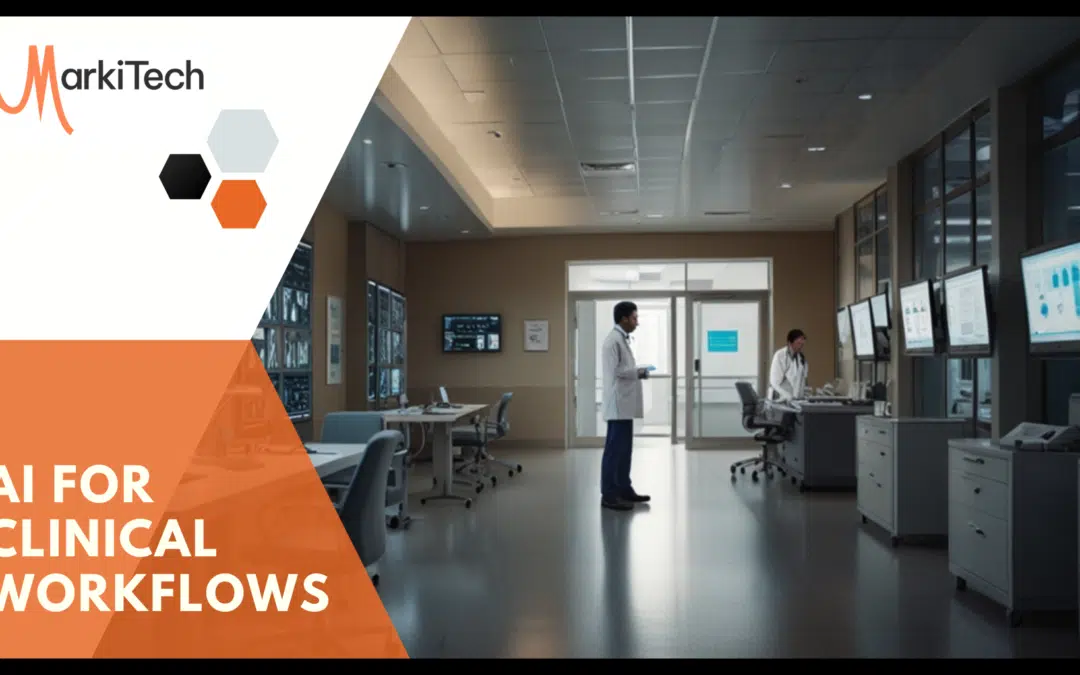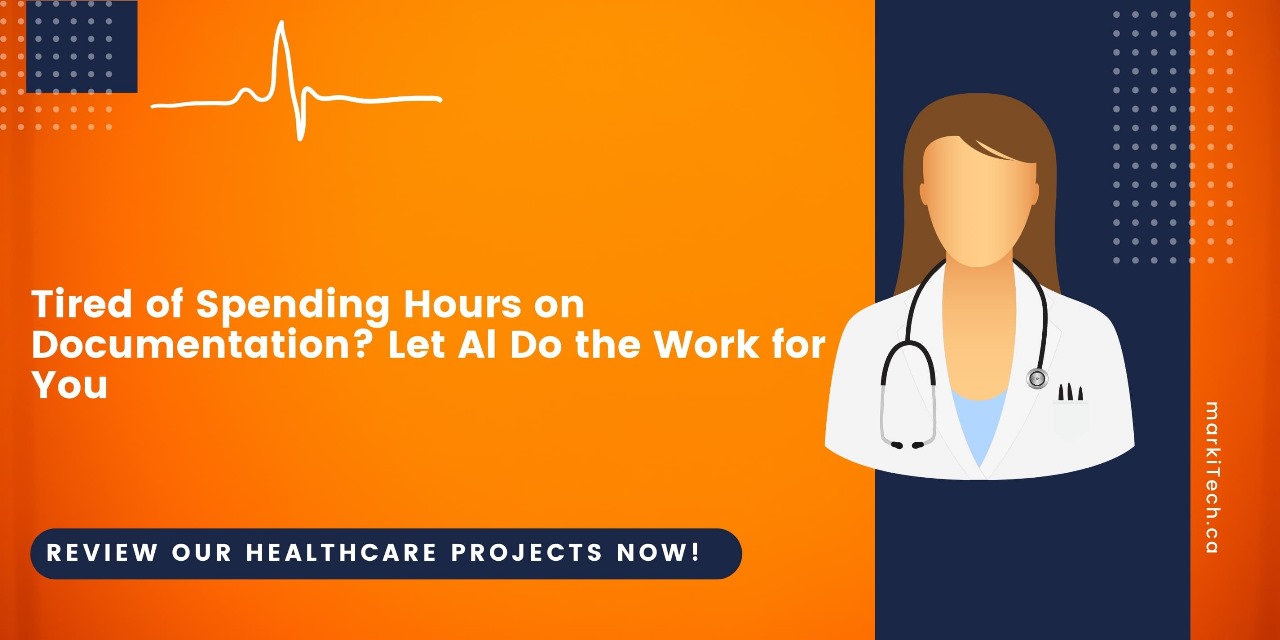Table of Contents
ToggleHealthcare Efficiency
Efficiency and precision stand out even at a cursory glance in the rapid world of healthcare. As more patients come seeking medical attention and the complexity of treatments increase, the need for simplification and elegance in the operations process while ensuring better patient care increases proportionately. This is where AI for clinical workflows helps seamlessly bridge that gap. Implementation of artificial intelligence in clinical settings will enable healthcare professionals to bring about better efficiency, reduce errors to a minimum, and eventually lead to better patient outcomes.
Today, we will talk about how AI for clinical workflows is changing the landscape of healthcare and what benefits this brings as well as to explore some future possibilities for the medical industry.
Understanding Clinical Workflows
With this in mind, there is a need to understand what clinical workflows are. In simple words, clinical workflows refer to a series of steps by which healthcare practitioners operationalize care to patients. They cover everything from receiving the patient and diagnosis to treatment and even follow-up. In addition, clinical workflows include administrative tasks such as scheduling, medical billing, and documentation. Perhaps clinical workflows are the most inefficient, time-consuming, and easily prone to human error. That is where AI in clinical workflows will find its potential, automating routine tasks and providing data-driven insights to healthcare providers.
The Role of AI in Clinical Workflows
Indeed, AI can help enhanced clinical workflows by automating repetitive tasks, helping in decision-making, and reducing the administrative burden. AI for clinical workflows helps medical professionals to work smarter, not harder. Some important areas include:
- Diagnosis and Treatment Recommendations :AI for clinical workflows is helping doctors in diagnostics. The huge burden of medical data is analyzed by AI, which makes it possible to deliver accurate diagnoses, identify possible complications, and provide real-time data-based treatment options specifically for a patient’s history.
- Clinical Documentation: This is perhaps the biggest time waster that deprives time spent on actually caring for patients. AI can automate large segments in the same setting allowing clinicians to dictate their notes as the AI presents an instant transcript, orders and even suggests corrections in real-time.
- Medication Management: AI systems will track a patient’s medication schedule to ensure the prescriptions are accurate and timely. AI for clinical workflows will reduce the errors in medicines and alert the health worker on a potential drug interaction or dosage issue.
- Predictive analytics in patient care: Predictive analytics, nourished by AI, will predict the future health of a patient. Inferred from a patient’s medical history, genetic information, and lifestyle factors, AI for clinical workflows can predict risks and recommend preventative measures to be avoided, thus bolstering patient outcomes.
Benefits of AI for Clinical Workflows
There are a number of advantages that can be gleaned by integrating AI into clinical workflows in healthcare settings:
- Increased Efficiency: AI streamlines routine tasks, such as appointment scheduling, documentation, and data processing, allowing more time for health care providers otherwise spent on patient care.
- Improved Accuracy: AI removes human error and gives correct data-driven insights on any issue. Whether it’s the diagnosis of some condition or prescription for a treatment plan, AI provides this.
- Better Patient Experience: Current workflows are leaner, leaving less turnaround time and clearer communication and more patient-oriented health care processes; that’s the real basis for better patient experience.
- Cost reduction: Through resource optimization and minimizing the extent to which humans are required to work by AI in clinical workflows, there will be significant cost reductions in operating healthcare facilities.
These are the types of solutions that MarkiTech specializes in – providing cutting-edge, AI-driven tools that improve the way operations are carried out in healthcare. MarkiTech uses technologies like AI to build strong clinical practices, increase efficiency, and advance health care.
AI for Clinical Workflows in Practice
Let’s take a look at the following real-life applications of AI for clinical workflows:
- Virtual Nursing Assistants: Intelligent assistants that can help in virtual assistance; they can set follow-up visits, be at their best to respond to the questions from patients, and even collect patient vital signs over the phone. This saves the nurse more time but still does not compromise care provision for patients.
- Radiology and Imaging: This is because AI can help radiologists quickly review scans and find some possible abnormality, thus ensuring nothing goes unnoticed. AI in radiology will work on thousands of images at speeds far faster than a human; thus it is an excellent application of AI in clinical workflows.
- Telemedicine: With telemedicine, AI-based platforms enable physicians to attend to patients virtually, offer real-time analysis, and monitor patients remotely as well. This is another way AI for clinical workflows transforms patient care by taking medical services directly to the patient’s house.
Challenges and Considerations
While the benefits of AI in clinical workflows are evident, some risks need to be covered for its successful implementation.
- Data privacy: Patient data is a critical concern when implementing AI systems. It’s essential that AI technologies be compliant with health care regulations, such as HIPAA, for maintaining confidentiality about patients’ data.
- Upfront costs: While AI for clinical workflows saves money in the long term, it has very high costs at upfront. However, health facilities with an investment in AI show up-high returns through increased efficiency and a decrease in labor costs.
- Integration with existing systems: Not all healthcare providers have the required infrastructure to handle AI technologies. This requires careful planning and coordinating integration of an AI technology into clinical workflows for seamless integration.
MarkiTech is an expert in AI for clinical workflows; it is providing such solutions to challenges at a place, ensuring seamless integration to the healthcare providers coupled with compliance to laws regarding privacy, which should provide long-term cost benefits.
The Future of AI in Healthcare
No doubt, technological advancement is the basis for the future of healthcare. Clinical workflows will be led by AI. Future tools in AI will only be more complex and sophisticated, yet they will only advance clinical efficiency, improve patient care, and lower healthcare costs.
AI for clinical workflows is going to revolutionize every aspect of healthcare-from predictive analytics to aiding and accelerating the delivery of better medical care. Companies like MarkiTech are on the forefront of this revolution and shaping the way towards innovative solutions that will make better AI-driven offerings available to healthcare providers.
Conclusion
Clinical workflows are being transformed entirely in the face of health care through the integration of AI to automate routine tasks, improve patient care, and efficiency in work. This means the role played by AI will only increase with time and offer even much bigger chances for innovation as it continues to gain its footing in clinical settings and their establishments. And as a necessity, health care providers looking at a point to be on the front rung would have to incorporate AI into clinical workflows. Moreover, with companies like MarkiTech leading the innovation drive, the shift into AI-based healthcare is the one that has never been so seamless.





